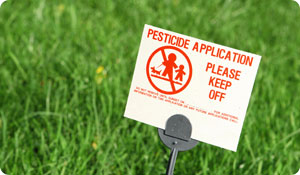
Americans are exposed to about 100,000 chemicals daily, and scientists have linked at least 220 of them to the development of cancer. It's impossible to eliminate our exposure to all potentially harmful substances. However, we can take steps to reduce our risk from common cancer-causing substances.
Tobacco. The single most important thing you can do to reduce your risk of lung and other cancers is not to smoke and to avoid exposure to second-hand smoke. The National Cancer Institute attributes about 30 percent of all cancer deaths to tobacco.
Alcohol. Alcohol increases your risk for breast cancer and cancers of the digestive system. If you drink, do so in moderation.
Pesticides. Thoroughly rinse fresh fruits and vegetables to wash away pesticide residue. Better yet, buy organic products whenever possible to avoid pesticides.
The sun. A daily dose of sun is healthy and vital. However, exposing yourself to excessive Ultraviolet Rays (UV) increases your risk for melanoma and skin cancer. When possible, avoid the sun between 10 a.m. and 4 p.m., when UV rays are the strongest. Don't use sun lamps or tanning beds. Both significantly increase your risk of developing cancer.
Household products. Paint thinners, grease removers, chemical dyes, wood smoke, gasoline, and vinyl chloride (found in plastics) are just a few of the many toxic substances you may be exposed to in your home. Scientists also link dust from fibers and dust (such as wood or silica) to the development of cancer.
If you must expose yourself to these toxins, work in a well-ventilated area and wear protective gear, such as gloves, eye goggles and face masks. If your occupation puts you in direct contact with dangerous substances, be sure your employer takes adequate steps to keep employees safe.
Sex. It may sound strange but sex could potentially cause cancer. HPV (Human papillomavirus) is a sexually transmitted disease that causes cervical and other cancers. Do not engage in unprotected sex and limit your number of sexual partners to lessen the likelihood of developing cancer.
Radon. Radon is a radioactive gas that can seep from the soil into cracks in the foundation of your house. Experts estimate that one in 20 homes have elevated radon levels. Purchase a home radon detector. It works like a smoke detector, alerting you to unsafe levels radon. If you have a basement, install a ventilation system to keep radon out of your home.
Sources
http://www.aicr.org/site/News2?abbr=pr_&page=NewsArticle&id=14613&news_iv_ctrl=2461
http://www.cancer.gov/cancertopics/understandingcancer/environment
http://www.cancer.gov/newscenter/Cancer-and-the-Environment
http://www.cancer.gov/newscenter/tip-sheet-cancer-and-the-environment
http://www.cancer.gov/newscenter/pressreleases/breastcancerenvironment
http://www.health-alliance.com/living/Cancer/cancer_07-01.html





